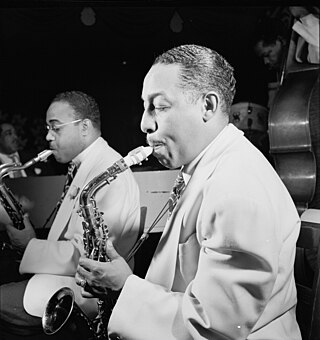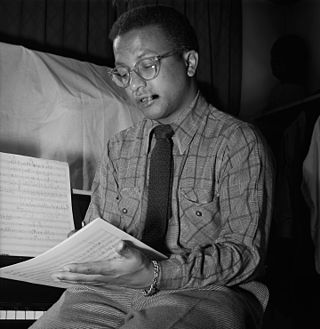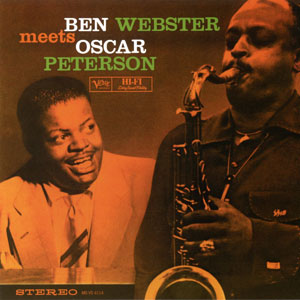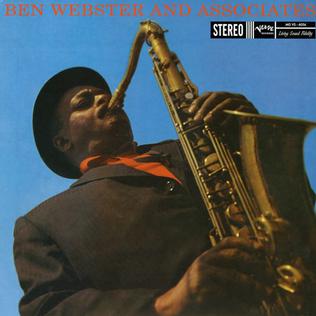
John Cornelius "Johnny" Hodges was an American alto saxophonist, best known for solo work with Duke Ellington's big band. He played lead alto in the saxophone section for many years. Hodges was also featured on soprano saxophone, but refused to play soprano after 1946. Along with Benny Carter, Hodges is considered to be one of the definitive alto saxophone players of the big band era.

William Thomas Strayhorn was an American jazz composer, pianist, lyricist, and arranger who collaborated with bandleader and composer Duke Ellington for nearly three decades. His compositions include "Take the 'A' Train," "Chelsea Bridge," "A Flower Is a Lovesome Thing," and "Lush Life".

Gerald Joseph Mulligan, also known as Jeru, was an American jazz saxophonist, clarinetist, composer and arranger. Though primarily known as one of the leading jazz baritone saxophonists—playing the instrument with a light and airy tone in the era of cool jazz—Mulligan was also a significant arranger working with Claude Thornhill, Miles Davis, Stan Kenton, and others. His piano-less quartet of the early 1950s with trumpeter Chet Baker is still regarded as one of the best cool jazz ensembles. Mulligan was also a skilled pianist and played several other reed instruments. Several of his compositions including "Walkin' Shoes" and "Five Brothers", have become standards.

Benjamin Francis Webster was an American jazz tenor saxophonist.
James George Hunter, known professionally as Jimmy Rowles, was an American jazz pianist, vocalist, and composer. As a bandleader and accompanist, he explored multiple styles including swing and cool jazz.

Ella at Duke's Place is a 1965 studio album by Ella Fitzgerald and Duke Ellington, accompanied by his Orchestra. While it was the second studio album made by Fitzgerald and Ellington, following the 1957 song book recording, a live double album Ella and Duke at the Cote D'Azur was recorded in 1966. Ella at Duke’s Place was nominated for Best Female Pop Vocal Performance at the 1967 Grammy Awards.

Ella and Duke at the Cote D'Azur is a 1967 live album by Ella Fitzgerald, accompanied by the big band of Duke Ellington.

Ella Fitzgerald Sings the Duke Ellington Song Book is a 1957 studio album by the American jazz singer Ella Fitzgerald, accompanied by Duke Ellington and his orchestra, focusing on Ellington's songs.

Ben Webster Meets Oscar Peterson is a studio album by American jazz saxophonist Ben Webster backed by the Oscar Peterson Trio, featuring rhythm section Ray Brown and Ed Thigpen, recorded on November 6, 1959 and released on Verve the following year.

The Blanton–Webster Band is a compilation album that combines the master takes of all the recordings by Duke Ellington's Orchestra during the years of 1940 to 1942, involving bassist Jimmy Blanton and tenor saxophonist Ben Webster. The recordings were originally made for RCA Victor during what many critics regard as the Ellington orchestra's golden period. The three CDs contain many numbers which were to become classics, and the arrangements were frequently inventive and innovative.

Never No Lament: The Blanton-Webster Band is a 2003 three-disc compilation combining the master takes of all the recordings by Duke Ellington's Orchestra during the years of 1940 to 1942 with an additional nine tracks, including five alternative takes and four additional masters. An expanded version of The Blanton–Webster Band, this reissue, according to Allmusic, "truly worth either an initial investment or reinvestment". All About Jazz: New York observed that these performances, from what is often considered "the band in its prime", "not only set the standard for big bands and jazz orchestras, but created an ideal near insurmountable to improve upon". The Penguin Guide to Jazz selected this compilation as part of its suggested "Core Collection."

Although it is billed as a Duke Ellington and Johnny Hodges album, Side by Side is a 1959 album mostly under the leadership of Johnny Hodges, Duke Ellington's alto saxophonist for many years. Ellington only appears on three of this album's tracks. The album places Hodges at the fore, backing him with piano by Ellington or Billy Strayhorn and providing other accompaniment by jazz figures like Ben Webster, Roy Eldridge, Harry "Sweets" Edison and Jo Jones. The album, a follow-up to Back to Back: Duke Ellington and Johnny Hodges Play the Blues, has remained perpetually in print.

"Chelsea Bridge" (1941) is an impressionistic jazz standard composed by Billy Strayhorn.

Stan Getz and the Oscar Peterson Trio is a 1958 studio album by Stan Getz, accompanied by the Oscar Peterson Trio.

Krupa and Rich is a 1956 studio album by jazz drummers Gene Krupa and Buddy Rich, released on Norman Granz' Clef Records. Krupa and Rich play on two different tracks each and play together only on "Bernie's Tune." Krupa and Rich would record again for Verve Records; their album Burnin' Beat was released in 1962.

Blues in Orbit is an album by American pianist, composer and bandleader Duke Ellington recorded for the Columbia label in 1959 and released in 1960.

Ben Webster and Associates is an album by American jazz saxophonist Ben Webster featuring tracks recorded in 1959 for the Verve label.

The Teddy Wilson Trio & Gerry Mulligan Quartet with Bob Brookmeyer at Newport is a live album by Teddy Wilson's Trio and Gerry Mulligan's Quartet recorded at the Newport Jazz Festival in 1957 and released on the Verve label.

Take the "A" Train is a 1956 album by the American jazz singer Betty Roché. It was Roché's debut album. Take the "A" Train was reissued on CD in 2000, with two alternate takes of "Go Away Blues".

Music for Loving is an album by American jazz saxophonist Ben Webster with tracks recorded in 1954 and released by Norgran in 1955. The album was reissued in 1957 by Verve as Sophisticated Lady. In 1996 Verve released a double CD compiling the album with another Norgran LP, Music with Feeling, and one by Harry Carney, Harry Carney with Strings which was first released by Clef.


















